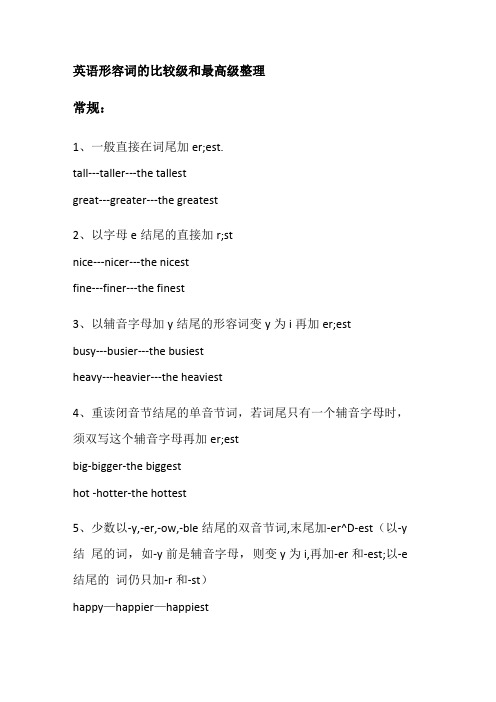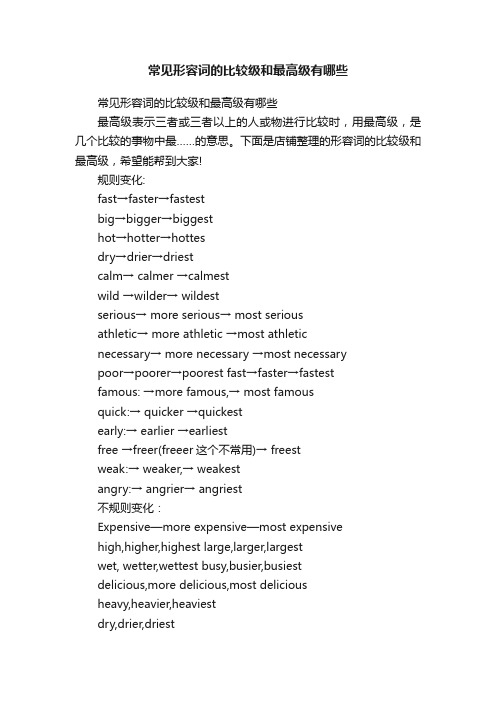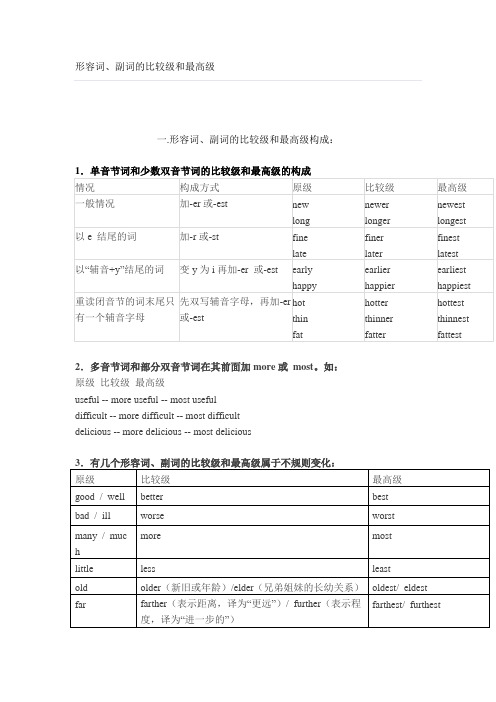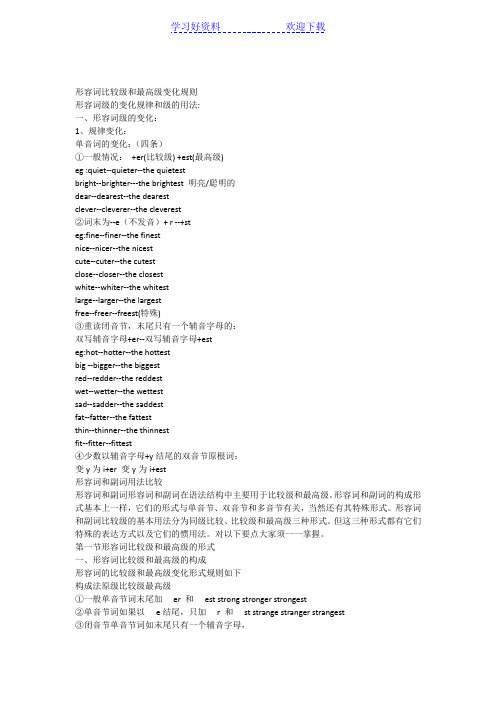几个形容词的比较级结构.
- 格式:doc
- 大小:11.50 KB
- 文档页数:2

英语形容词的比较级和最高级整理常规:1、一般直接在词尾加er;est.tall---taller---the tallestgreat---greater---the greatest2、以字母e结尾的直接加r;stnice---nicer---the nicestfine---finer---the finest3、以辅音字母加y结尾的形容词变y为i再加er;estbusy---busier---the busiestheavy---heavier---the heaviest4、重读闭音节结尾的单音节词,若词尾只有一个辅音字母时,须双写这个辅音字母再加er;estbig-bigger-the biggesthot -hotter-the hottest5、少数以-y,-er,-ow,-ble结尾的双音节词,末尾加-er^D-est(以-y 结尾的词,如-y前是辅音字母,则变y为i,再加-er和-est;以-e 结尾的词仍只加-r和-st)happy—happier—happiestclever—cleverer—cleverest5、多音节和部分双音节词在词前加more、mosteasily--more easily--most easilybeautiful--more beautiful--the most beautiful特殊:(1 )有些单音节词的比较等级常用more和most,如glad,fond,shy,sly(但like 只可用more 和most)。
Eg:I am not more glad than you.我可没像你那样高兴。
Uncle Jack was more like a book of reference to my father.杰克大叔对我父亲来说真是一部参考书。
(2)有些单音节词用-er和-est或more和most皆可,如free,clear 等。
Eg:I'm clearer/more clear about it than before.对这事,我比以前更清楚了。

形容词的比较级和最高级: 形容词的比较级和最高级形式是在形容词的原级形式的基础上变化的。
分为规则变化和不规则变化。
规则变化如下:1) 单音节形容词的比较级和最高级形式是在词尾加 -er 和 -est 构成。
great (原级) greater(比较级) greatest(最高级) 2) 以 -e 结尾的单音节形容词的比较级和最高级是在词尾加 -r 和 -st 构成。
nice (原级) nicer(比较级) nicest(最高级)3)少数以-ow, -ple结尾的双音节形容词的比较级和最高级是在词尾加 -er 和 -est 构成。
narrow (原级) narrower(比较级)narrowest(最高级)simple (原级) simpler(比较级) simplest(最高级)4) 以 -y 结尾,但 -y 前是辅音字母的形容词的比较级和最高级是把 -y 去掉,加上 -ier 和-est 构成.happy (原形) happier (比较级) happiest (最高级)5) 以一个辅音字母结尾其前面的元音字母发短元音的形容词的比较级和最高级是双写该辅音字母然后再加 -er和-est。
big (原级) bigger (比较级) biggest (最高级) 6) 以–ing/ -ed结尾, 比较级和最高级需用more 和 most 加在形容词前面来构成。
boring (原级) more boring (比较级) most boring (最高级)interested (原级) more interested (比较级) most interested (比较级)7) 以两个辅音结尾的形容词,比较级和最高级需用more 和 most 加在形容词前面来构成。
strict (原级) more strict (比较级) most strict (最高级)8) 其他双音节和多音节形容词的比较级和最高级需用more 和 most 加在形容词前面来构成。

形容词比较级有以下几种变化形式1.形容词原形加-er,如tall---taller,short---shorter,long---longer,fast---faster,old---older,young---younger,small---smaller等。
2.以辅音字母加-y结尾的形容词,把y改成i,再加-er,如:heavy---heavier,happy---happier,funny---funnier等。
3.重读闭音节结尾的形容词末尾只有一个辅音字母,要双写末尾字母,再加-er,如fat---fatter,thin---thinner,big---bigger,hot---hotter等。
例如:太阳比月亮大。
The sun is bigger than the moon.今天比昨天更热。
Today is hotter than yesterday.4.多音节形容词的比较级要用more加形容词原形,如:beautiful---more beautiful,interesting---more interesting,delicious---more delicious,expensive---more expensive,exciting---more exciting等。
例如:这个钱包比那个更漂亮。
This wallet is more beautiful than that one.他的书比你的书更有意思。
His book is more interesting than yours.5.形容词比较级的不规则变化,如:good/well---better。
你的家人或朋友生病了,你可以说I hope you get better soon.希望您早日康复。
又如:bad---worse,如果你最近很忙,但是又遇到很多麻烦事,你可以说Things can’t be worse.真是糟糕透了!其他常见的不规则变化有:old---older/elder,much/many---more,little---less,far---farther/further。

形容词比较级和最高级的构成和用法(单音节及部分双音节形容词的比较级和最高级规则变化)音节是读音的基本单位,在英文中元音因素很关键,一个元音因素可以构成一个音节。
一个单词中有几个元音因素,就有几个音节。
单音节词long/lɒŋ/双音节词busy/ˈbɪz i/多音节词expensive/ɪkˈsp e nsɪv/一、单音节才形容词的比较级和最高级以-er和-est结尾1.一般情况下直接在词尾加-er和-est。
sm a ll-small er-small estl o ng-long er-long estf a st-fast er-fast estt al l-tall er-tall esth ar d-hard er-hard estgr ea t-great er-great est2.以不发音的字母-e结尾的单词在词尾直接加-r或-st。
l a te-lat er-lat estf i ne-fin er-fin estl ar ge-larg er-larg estn i ce-nic er-nic est3.以辅音字母+y结尾的词,把y变成i,再加-er或-est。
dr y-dr ier-dr iest/ˈdraɪɪst/happ y-happ ier-happ iest/ˈhæpɪɪst/eas y-eas ier-eas iest/ˈiːzɪɪst/4.以重度闭音节结尾的词,末尾只有一个辅音字母时,先双写这个辅音字母,再加-er或-est。
b i g-big ger-big gesth o t-hot ter-hot testth i n-thin ner-thin nest二、大多数双音节词用more和most来构成比较级和最高级以-y结尾和以-ow结尾的双音节形容词比较级和最高级多半采用-er 和est形式。
happ y-happ ier-happ iestprett y-prett ier-prett iestnarr ow-narrow er-narrow estshall ow-shallow er-shallow est1.比较级只用于两者之间构成:比较级+than若比较的东西比较明显,than之后可以省去。

形容词的比较级大全形容词是我们日常生活中经常用到的词语,它们可以用来形容人、物、事物的特征或性质。
而形容词的比较级则是用来比较两个事物之间的差异,表示其中一方具有更高或更低的属性。
下面就为大家罗列一些常用形容词的比较级以及其相应的用法。
1. 比较级:big(大)- bigger(更大)用法:The elephant is bigger than the mouse.(象比老鼠更大。
)2. 比较级:small(小)- smaller(更小)用法:The ant is smaller than the beetle.(蚂蚁比甲虫更小。
)3. 比较级:tall(高)- taller(更高)用法:The giraffe is taller than the zebra.(长颈鹿比斑马更高。
)4. 比较级:short(短)- shorter(更短)用法:The pencil is shorter than the ruler.(铅笔比尺子更短。
)5. 比较级:long(长)- longer(更长)用法:The snake is longer than the worm.(蛇比虫子更长。
) 6. 比较级:fast(快)- faster(更快)用法:The cheetah is faster than the lion.(猎豹比狮子跑得更快。
)7. 比较级:slow(慢)- slower(更慢)用法:The turtle is slower than the rabbit.(乌龟比兔子跑得更慢。
)8. 比较级:easy(容易)- easier(更容易)用法:The multiple-choice test is easier than the essay test.(选择题比论述题更容易。
)9. 比较级:difficult(困难)- more difficult(更困难)用法:Calculus is more difficult than algebra.(微积分比代数更困难。

形容词比较级有以下几种变化形式1.形容词原形加-er,如tall---taller,short---shorter,long---longer,fast---faster,old---older,young---younger,small---smaller等。
2.以辅音字母加-y结尾的形容词,把y改成i,再加-er,如:heavy---heavier,happy---happier,funny---funnier等。
3.重读闭音节结尾的形容词末尾只有一个辅音字母,要双写末尾字母,再加-er,如fat---fatter,thin---thinner,big---bigger,hot---hotter等。
例如:太阳比月亮大。
The sun is bigger than the moon.今天比昨天更热。
Today is hotter than yesterday.4.多音节形容词的比较级要用more加形容词原形,如:beautiful---more beautiful,interesting---more interesting,delicious---more delicious,expensive---more expensive,exciting---more exciting等。
例如:这个钱包比那个更漂亮。
This wallet is more beautiful than that one.他的书比你的书更有意思。
His book is more interesting than yours.5.形容词比较级的不规则变化,如:good/well---better。
你的家人或朋友生病了,你可以说I hope you get better soon.希望您早日康复。
又如:bad---worse,如果你最近很忙,但是又遇到很多麻烦事,你可以说Things can’t be worse.真是糟糕透了!其他常见的不规则变化有:old---older/elder,much/many---more,little---less,far---farther/further。

形容词、副词的比较等级及其用法形容词和副词有三个比较等级,即:1. 原级,也就是原形。
2. 比较级,表示“较……”或“更……”的意思。
(用于两者之间比较)3. 最高级,表示“最……”的意思。
(用于三者或三者以上的比较)首先,我们先来看看形容词、副词的比较级和最高级是如何构成的?1. 单音节词和少数以-er,-ow结尾的双音节单词,比较级在后面加-er,最高级在后面加-est。
① 单音节单词small→smaller→smallestshort→shorter→shortesttall→taller→tallestgreat→greater→greatest② 少数以-er,-ow结尾的双音节单词clever→cleverer→cleverestnarrow→narrower→narrowest2. 以不发音e结尾的单音节单词,比较级在原形后加-r,最高级在原级后加-st。
large→larger→largestnice→nicer→nicestable→abler→ablest3. 以一个辅音字母结尾的闭音节(即:辅音+元音+辅音)单词中,先双写末尾的辅音字母,比较级加-er,最高级加-est。
big→bigger→biggesthot→hotter→hottestfat→fatter→fattest4. 以“辅音字母+y”结尾的双音节词,把y改为i,比较级加-er,最高级加-est。
easy→easier→easiestheavy→heavier→heaviestbusy→busier→busiesthappy→happier→happiest5. 其他双音节词和多音节词,比较级在前面加more,最高级在前面加most。
beautiful→morebeautiful→most beautifuldifferent→moredifferent→most differenteasily→moreeasily→most easily6. 有少数形容词、副词的比较级和最高级是不规则的,必须熟记。

聚焦形容词和副词的比较概述:大多数形容词和副词有三个级:原级(即原形)、比较级和最高级。
形容词和副词按变化可以分为规则形容词词和副词和不规则形容词词和副词规则I。
形容词词和副词的比较级和最高级变化规则如下:一.所有单音节和部分双音节如何变比较级和最高级1 一般在词末尾加er变比较级,加est变最高级strong —stronger -strongest small——smaller--smallesthard→harder →hardest fast→faster →fastest2 如果以e结尾,只加r 和stnice-—nicer-—nicest fine-—finer——finest3 以重读闭音节,末尾只有一个辅音字母,须先双写这个辅音字母,再加er和est sad——sadder—- saddest big——bigger——biggest hot-—hotter —-hottest4 以辅音字母加y结尾的词,把y变成i,再加er和est,angry—-angrier-angriest early→earlier →earliest hungry—hungrier-hungriest但是,开放类副词即形容词加ly结尾变成的副词加more或most.如quickly →more quickly →most quickly quietly →more quietly →most quietly slowly—more slowly—most slowly[注]:early中的ly不是后缀,故把y变i再加er和est二大部分双音节和所有多音节词都在其前面加more变比较级,加most变最高级different -more different —most differentbeautiful-—more beautiful--the most beautifulexpensive-—more expensive--the most expensive但是,以形容前缀un结尾的三音节形容词不适合上述情况,如unhappy,untidy,我们可以说:unhappier→unhappiest,untidier→untidiest三,不规则形容词和副词的比较级和最高级good / well —— better—— best badly/bad / ill —- worse —- worstmany/ much-— more--most little —- less-- leastfar-— farther——farthest 或further-—furthestII,形容词与副词的原级、比较级和最高级的基本用法一、原级比较的基本用法:原级比较由“…。

比较级和最高级的用法:修饰动词比较级的用法比较级是用来在两个事物之间进行比较的。
在修饰动词时,我们可以使用以下几种结构:1. 形容词比较级形容词比较级表示一个动作或状态在两个对象之间的程度差异。
常见的形容词比较级的结构为:[主语] + [动词] + [形容词比较级] + [than] + [另一个对象]例如:- 这本书比那本书更有趣。
- 我比你跑得更快。
2. 副词比较级副词比较级也可以用来修饰动词,表示一个动作在两个对象之间的程度差异。
常见的副词比较级的结构为:[主语] + [动词] + [副词比较级] + [than] + [另一个对象]例如:- 他写作业写得比我认真。
- 她比我应对压力更好。
3. "more" + 形容词原级有些形容词是无法直接加上比较级后缀的,此时我们可以使用"more"来修饰形容词。
结构如下:[主语] + [动词] + [more] + [形容词原级] + [than] + [另一个对象] 例如:- 这种食物更美味。
- 这位演员更有天赋。
最高级的用法最高级用来表示在三个或多个对象之间的程度差异。
当修饰动词时,我们可以使用以下结构:1. 形容词最高级形容词最高级用来表示一个动作或状态在多个对象中的最高或最低程度。
常见的形容词最高级结构为:[主语] + [动词] + [形容词最高级] + [of/in] + [多个对象]例如:- 我是我们班最聪明的学生。
- 这是我读过的最好的书。
2. 副词最高级副词最高级也可以用来修饰动词,表示一个动作在多个对象之间的最高或最低程度。
常见的副词最高级结构为:[主语] + [动词] + [副词最高级] + [of/in] + [多个对象]例如:- 他是我们队里跑得最快的。
- 这个地方是我去过的最美丽的地方。
3. "the most" + 形容词原级与比较级类似,有些形容词无法直接加上最高级后缀,此时我们可以使用"the most"来修饰形容词。

常见形容词的比较级和最高级有哪些常见形容词的比较级和最高级有哪些最高级表示三者或三者以上的人或物进行比较时,用最高级,是几个比较的事物中最……的意思。
下面是店铺整理的形容词的比较级和最高级,希望能帮到大家!规则变化:fast→faster→fastestbig→bigger→biggesthot→hotter→hottesdry→drier→driestcalm→ calmer →calmestwild →wilder→ wildestserious→ more serious→ most seriousathletic→ more athletic →most athleticnecessary→ more necessary →most necessarypoor→poorer→poorest fast→faster→fastestfamous: →more famous,→ most famousquick:→ quicker →qu ickestearly:→ earlier →earliestfree →freer(freeer这个不常用)→ freestweak:→ weaker,→ weakestangry:→ angrier→ angriest不规则变化:Expensive—more expensive—most expensivehigh,higher,highest large,larger,largestwet, wetter,wettest busy,busier,busiestdelicious,more delicious,most deliciousheavy,heavier,heaviestdry,drier,driesteasy easier easiestlazy lazier laziestpretty prettier prettiestnaughty naughtier naughtiestmealy mealier mealiestearly earlier earliestthirsty thirstier thirstiestfar→farther→farthestfar→further→furthestDull—duller--dullestLoud-louder--loudestBoring—more boring—most boringCreative—more creative—most creativeWarm---warmer--warmestgood / well→better→bestbad / ill→worse→worstmany / much→more→mostlittle→less→leastlate→later→ / latestlate→latter→last【拓展】关于形容词和副词的比较级一、含义1. 大多数形容词和副词有三个等级:原级、比较级、最高级: good – better - best2. 比较级:表示两者(人或物)之间的比较。

(一 )比较级和最高级的构成:1 加-er,-est 构成比较级和最高级。
【1】单音节形容词和副词high-higher-highest hard-harder-hardest 【2】以不发音的 -e 结尾的safe-safer-safest late-later-latest【3】辅音字母要双写的情况:【4】以辅音加 -y 结尾的情况dry-drier-driest merry-merrier-merrist 2 加 more,most 构成比较级和最高级。
【1】多音节的形容词和副词expensive-more expensive-most expensivecarefully-more carefully-most carefully【2】由形容词加 -ly 构成的副词slowly-more slowly-most slowlyhighly-more highly-most highly【3】以-ful,-less,-able,-ous,-ive,-ing 等结尾的双音节形容词useless-more useless-most uselessserious-more serious-most seriuos【4】分词形容词 tired,pleased 及 glad,often,real,right,wrong 等单音节形容词tired-more tired-most tiredglad-more glad-most glad( 3 )形容词、副词的比较级和最高级的不规则构成法。
bad/ill/badly-worse-worstmany/much-more-mostlittle-less-leastfar-farther/further-farthest/furthestold-older/elder-oldest/eldest(二) 比较级和最高级的用法1 比较级的表示法:主语 +be +比较级+than …;主语+谓语+比较级+than …( 1 )不同主语的比较:He is two years younger than I.This machine works better than that one.Li Ming studies harder than Wang Ling.( 2 )同一主语不同方面的比较:She is now happier than she has ever been.The exam was easier than we expected.We have had much more rain this year than last year.( 3 )用于修饰比较级的词: even,(very) much,far,a lot,stillThis book is much thicker than that one.He works even harder than before.( 1 ) 形容词和副词最高级的用法三者或三者以上的比较用最高级。


形容词、副词的比较级和最高级一.形容词、副词的比较级和最高级构成:总结为“两好,两坏,两多,一少,一老,一远” 不规则。
注意:healthy--healthier----healthiestfriendly---friendlier---friendliestcrowded---more crowded---most crowded二.形容词、副词比较级的用法1.形容词的比较级可以单独使用:Be more careful next time. 下次小心点。
Which book is better? 哪本书更好?2.也可以和than连用,表示两者相比,than后可以跟:a. 名词或代词:He is older than me / I .他年龄比我大。
b. 动名词:Skiing is more exciting than skating.滑雪比滑冰更刺激。
c. 从句:I was a better singer than he was.我唱歌比他好。
句型1:as+形容词原形+asThis jacket is as beautiful as that one.句型2. not as+形容词原形+as=not so+形容词原形+as前者不及/不如后者This school is not as beautiful as that one.表达前者不如后者还可以用:less +原级+thanThis school is less beautiful than that one。
句型3 :1)表示“是......的几倍时” ......倍数+as 原级as....... This garden is ten times as large as that one。
这个花园是那个的九倍大。
倍数的表达:once ; twice ; three times; four times.......2)表示“比...多几倍” 倍数+ 比较级+than ....His garden is 9 times larger than that one.他的花园比那个大九倍。

形容词比较级和最高级变化规则形容词级的变化规律和级的用法:一、形容词级的变化:1、规律变化:单音词的变化:(四条)①一般情况:+er(比较级) +est(最高级)eg :quiet--quieter--the quietestbright--brighter---the brightest 明亮/聪明的dear--dearest--the dearestclever--cleverer--the cleverest②词末为--e(不发音)+ r --+steg:fine--finer--the finestnice--nicer--the nicestcute--cuter--the cutestclose--closer--the closestwhite--whiter--the whitestlarge--larger--the largestfree--freer--freest(特殊)③重读闭音节,末尾只有一个辅音字母的:双写辅音字母+er--双写辅音字母+esteg:hot--hotter--the hottestbig --bigger--the biggestred--redder--the reddestwet--wetter--the wettestsad--sadder--the saddestfat--fatter--the fattestthin--thinner--the thinnestfit--fitter--fittest④少数以辅音字母+y结尾的双音节原根词:变y为i+er 变y为i+est形容词和副词用法比较形容词和副词形容词和副词在语法结构中主要用于比较级和最高级。
形容词和副词的构成形式基本上一样,它们的形式与单音节、双音节和多音节有关,当然还有其特殊形式。
形容词和副词比较级的基本用法分为同级比较、比较级和最高级三种形式。
但这三种形式都有它们特殊的表达方式以及它们的惯用法。

形容词和副词有三个比较等级,即:1. 原级,也就是原形。
2.比较级,表示“较……”或“更……”的意思。
(用于两者之间比较)3.最高级,表示“最……”的意思。
(用于三者或三者以上的比较)首先,我们先来看看形容词、副词的比较级和最高级是如何构成的?1.单音节词和少数以-er, -ow结尾的双音节单词,比较级在后面加-er,最高级在后面加-est。
①单音节单词small→smaller→smallestshort→shorter→shortesttall→taller→tallestgreat→greater→greatest②少数以-er, -ow结尾的双音节单词clever→cleverer→cleverestnarrow→narrower→narrowest2.以不发音e结尾的单音节单词,比较级在原形后加-r,最高级在原级后加-st。
large→larger→largestnice→nicer→nicestable→abler→ablest3.以一个辅音字母结尾的闭音节(即:辅音+元音+辅音)单词中,先双写末尾的辅音字母,比较级加-er,最高级加-est。
big→bigger→biggesthot→hotter→hottestfat→fatter→fattest4.以“辅音字母+y”结尾的双音节词,把y改为i,比较级加-er,最高级加-est。
easy→easier→easiestheavy→heavier→heaviestbusy→busier→busiesthappy→happier→happiest5.其他双音节词和多音节词,比较级在前面加more,最高级在前面加most。
beautiful→more beautiful→most beautifuldifferent→more different→most differenteasily→more easily→most easily6.有少数形容词、副词的比较级和最高级是不规则的,必须熟记。

学英语形容词比较级顺口溜比较级是形容词,一好一坏要记牢,good更好是better,bad更坏是worse结尾有e只加r,nice加r变nicer;双写目前有5个,bigger,fatter,hotter,sadder和thinner其余全部加er。
小学英语常见形容词及比较级变化一览表1.在形容词词尾加上“er”“构成比较级:cheap(便宜的)—cheaper clean(干净的)—cleanerclever(聪明的)—cleverer cold(寒冷的)—coldercool(凉的)—cooler dark(黑暗的)—darkerfast(迅速的)—faster great(伟大的)—greaterhard(困难的,硬的)—harder low(低的)—lowerhigh(高的)—higher kind(善良的)—kinderlight(轻的)—lighter long(长的)—longernear(近的)—nearer new(新的)—newerquiet(安静的)—quieter rich(富裕的)—richershort(短的)—shorter slow(慢的)—slowersmall(小的)—smaller smart(聪明的)—smarterstrong(强壮的)—stronger sweet(甜的)—sweetertall(高的)-taller young(年轻的)—younger2.双写最后一个字母,再加上“er”构成比较级:big(大的)—bigger fat(胖的)—fatterhot(热的)—hotter sad(伤心的)—sadderthin(瘦的)—thinner3.以不发音的字母e结尾的形容词,加上“r”构成比较级:close(接近的)—closer fine(好的,完美的)—finer large(巨大的)—larger late(迟的)—laternice(好的)—nicer white(白的)—whiter4.以字母y结尾的形容词,把y改为i,再加上“er”构成比较级:busy(忙碌的)—busier dirty(脏的)—dirtierearly(早的)—earlier easy(容易的)—easierfriendly(友好的)—friendlier pretty(美丽的)—prettier funny(好玩的)—funnier happy(开心的)—happier healthy(健康的)—healthier heavy(重的)—heavierhungry(饿的)—hungrier lazy(懒惰的)—lazierlucky(幸运的)—luckier noisy(嘈杂的)—noisier 5.双音节、多音节形容词,在单词前面加上“more”构成比较级:afraid(害怕的)—more afraidbeautiful(美丽的)—more beautifulcareful(仔细的)—more carefuldelicious(美味的)—more deliciousexciting(令人兴奋的)—more excitingexpensive(昂贵的)—more expensivefamous(著名的)—more famoushard-working(勤奋的)—more hard-workinghelpful(有帮助的)—more helpfulinteresting(有趣的)—more interestingpolite(有礼貌的)—more politetired(累的)—more tired6.不规则变化的形容词:bad(坏的)—worse far(远的)—farthergood(好的)—better ill(病的)—worselittle(少的)—less many(多的)—moremuch(多的)—more well(好的,身体好的)—better old(年老的)—older(elder)。

形容词比较级结构
形容词比较级用于比较两个人或事物的程度,通常由“更”、“比较”等词引导。
形容词比较级的基本结构如下:
1. 单音节形容词:直接在形容词后面加“-er”,如“更高”(taller)、“更快”(faster)。
2. 双音节形容词:在形容词前面加“more”,如“更聪明”(more intelligent)、“更美丽”(more beautiful)。
3. 多音节形容词:在形容词前面加“more”,如“更有吸引力”(more attractive)、“更有价值”(more valuable)。
需要注意的是,有些形容词比较级的形式是不规则的,需要记忆,如“更好”(better)、“更坏”(worse)、“更远”(further)等。
此外,有些形容词比较级的用法也有一些特殊情况,如“越来越……”(more and more + 形容词原级)、“两者中更……”(the + 比较级 + of the two)等。
1。
几个形容词的比较级结构
"比较级 + and + 比较级"
(后面不可接than从句可用来表示"越来越"。
如:
The days are getting longer and longer.白天越来越长了。
He is becoming more and more interested in sports. 他对运动越来越有兴趣了。
The more the more 的用法
意思是"越…,就越…"。
如:
The harder you work,the more you Will learn.你越努力,就越学得多。
The greater the mass of a body,the greater is its inertia.物体的质量越大,它的惯性就越大。
The more you eat,the fatter you get.你吃得越多,长得越胖。
The more,the better.越多越好。
more than和less than
这两个固定词组分别表示"多于""少于"。
如:
There are more than three hundred households in this village.这个村子有三百多户人家。
The finished the Work in less than a year.他们不到一年就完成这项工作。
Our country has established diplomatic relations with more than one hundred countries.我国已经和一百多个国家建立了外交关系。
no more than和not more than
no more than的意思是"只不过",not more than的意思是"不多于"。
试比较: There are no more than ten tickles left. 剩下不到十张票。
(有"票少"的含义
The experiment was done by not more than 5 persons. 做这个试验的人不到五个。
(没有"多"或"少"的含义,只是客观地说明数目
This room is no bigger than that. 这个房间并不比那个大。
(有"两个房间都不大"的含义
This room is not bigger than that one.这个房间不比那个大。
(没有"两个房间都
不大或都不小"的含义。